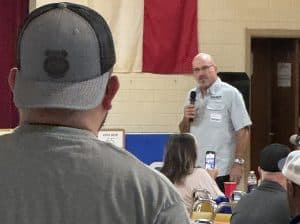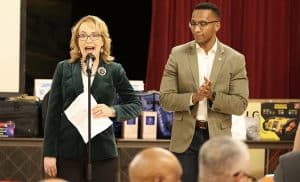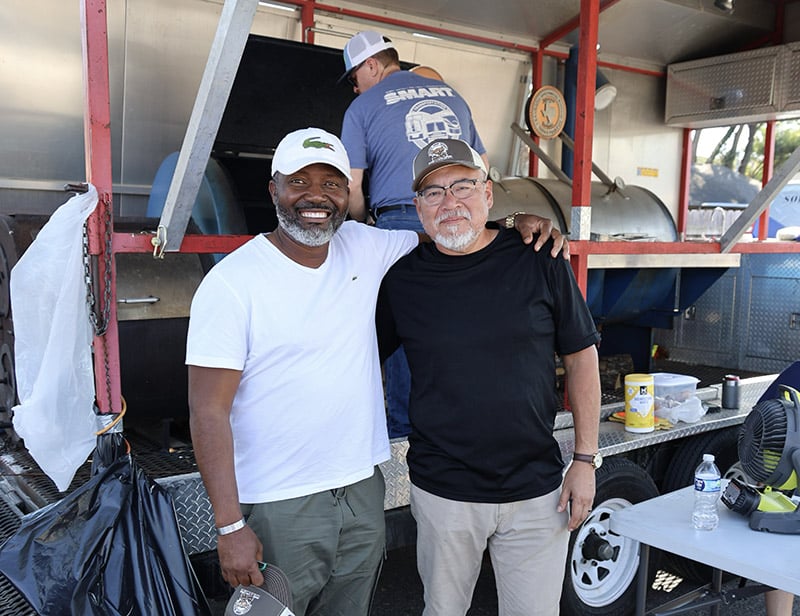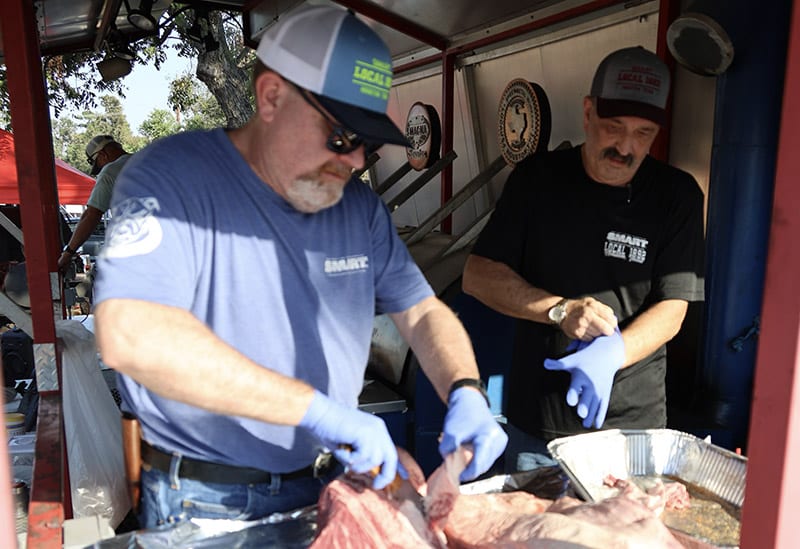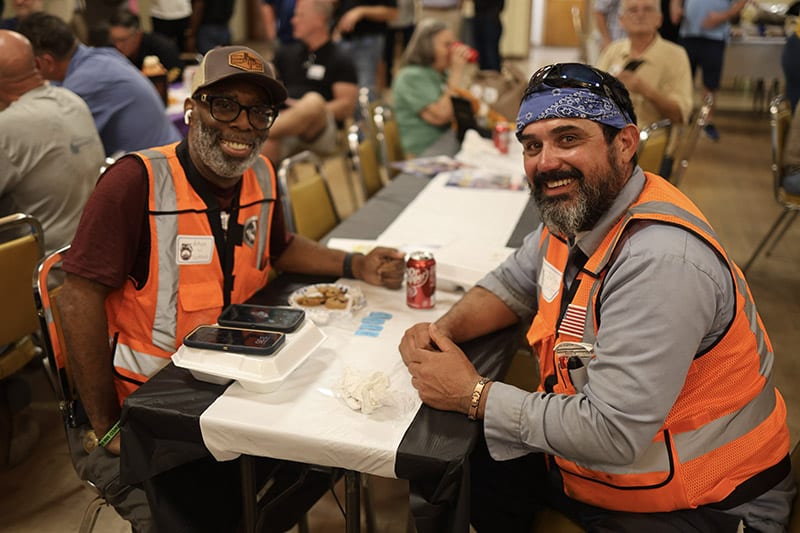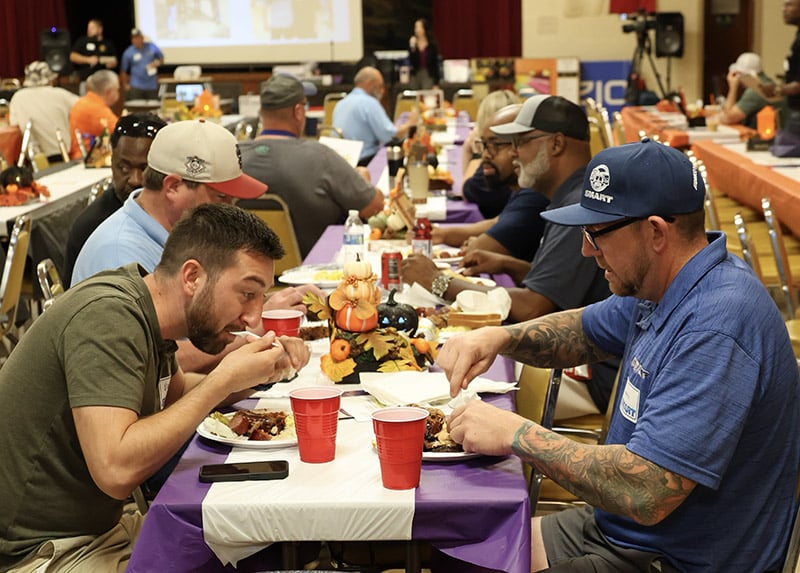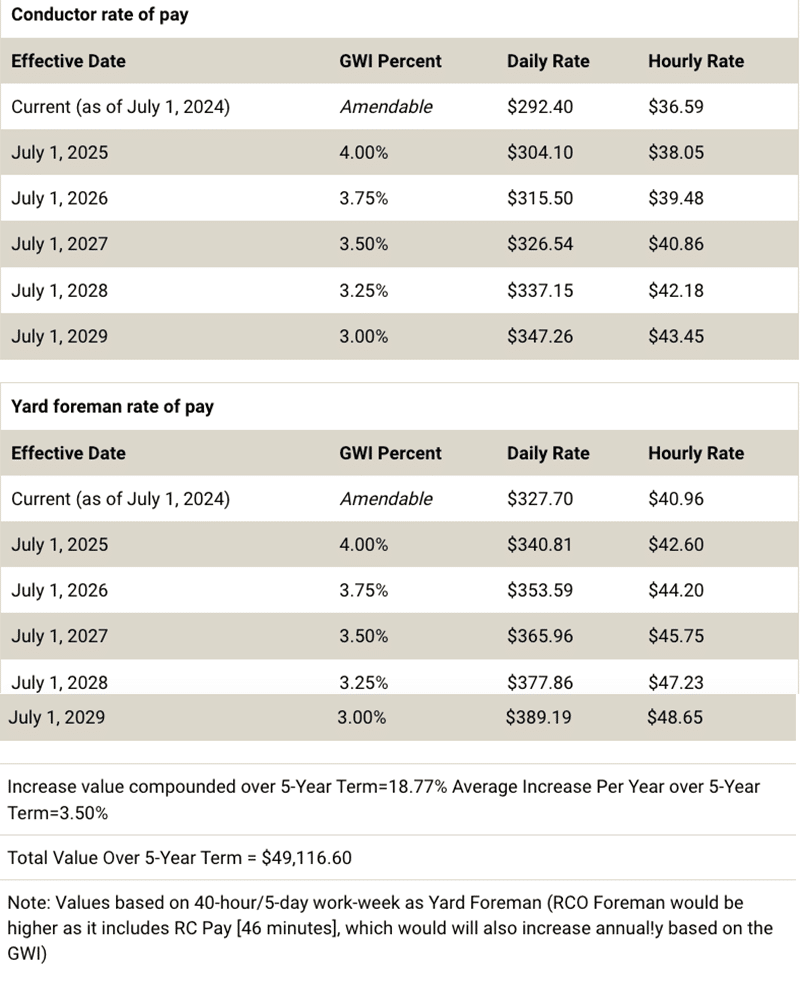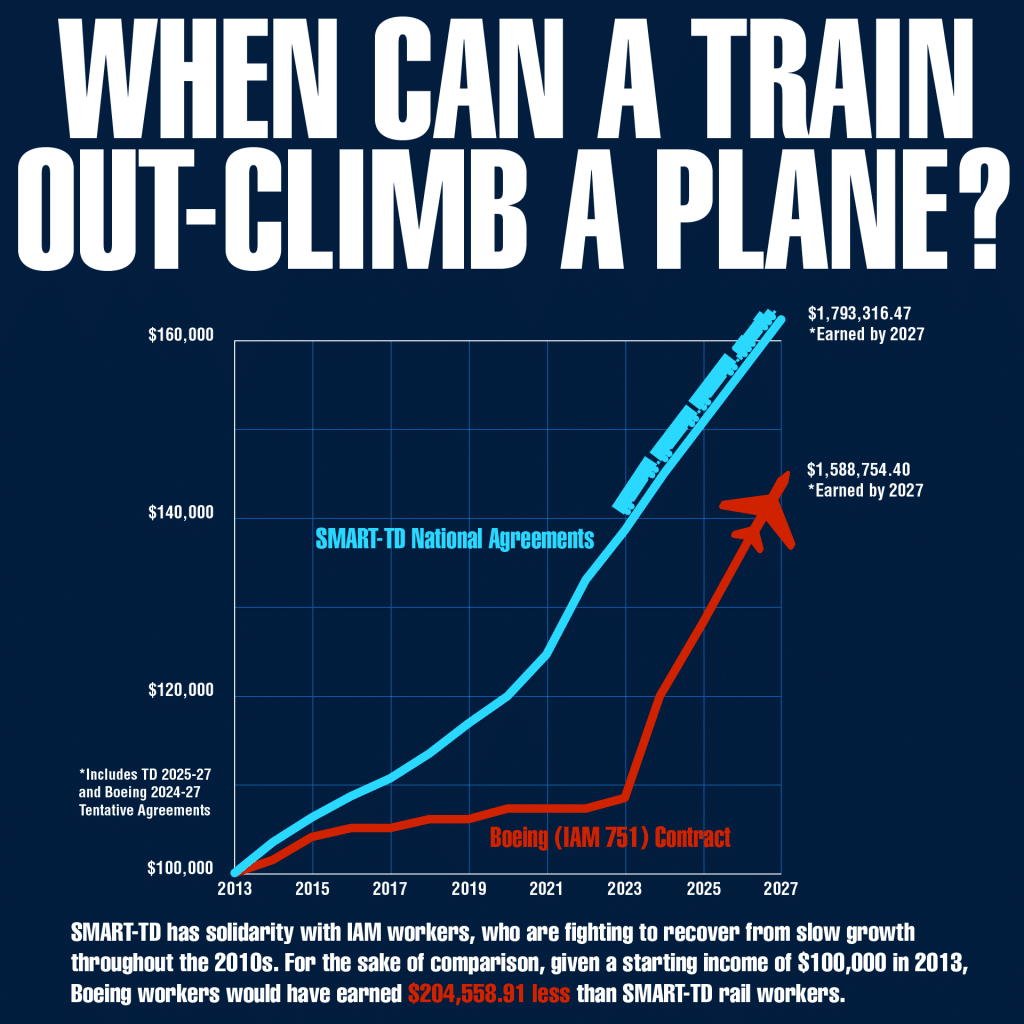Prior to the Nov. 5, 2024, election, your union has endorsed the following candidates to represent workers’ interests in Washington, D.C.
These selections were made by SMART Transportation Division state legislative boards and national leadership with careful consideration as to the candidates’ track record regarding issues affecting your workplace. In short — who is with us and who is against us.
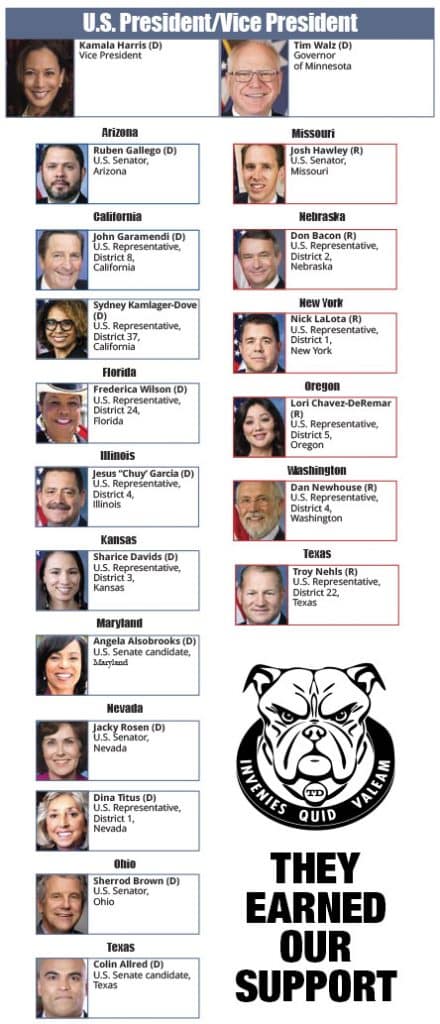
^ denotes an incumbent candidate
President/Vice President:
Kamala Harris/Tim Walz
Alabama
House of Representatives
Dist. 2: Shomari Figures (D)
Dist. 7: Terri A. Sewell (D)^
Alaska
House of Representatives
At Large: Mary Peltola (D)^
Arizona
U.S. Senate
Ruben Gallego
House of Representatives
Dist. 1: Amish Shah (D)
Dist. 3: Yassamin Ansari (D)
Dist. 4: Greg Stanton (D)^
Dist. 7: Raul Grijalva (D)^
Arkansas
House of Representatives
Dist. 2: Marcus Jones (D)
Dist. 3: Caitlin Draper (D)
Dist. 4: Risie Howard (D)
California
Senate
Adam Schiff (D)
House of Representatives
Dist. 2: Jared Huffman (D)^
Dist. 3: Jessica Morse (D)
Dist. 4: Mike Thompson (D)^
Dist. 5: Mike Barkley (D)
Dist. 6: Ami Bera (D)^
Dist. 7: Doris Matsui (D)^
Dist. 8: John Garamendi (D)^
Dist. 9: Josh Harder (D)^
Dist. 10: Mark DeSaulnier (D)^
Dist. 11: Nancy Pelosi (D)^
Dist. 12: Lateefah Simon (D)
Dist. 13: Adam Gray (D)
Dist. 14: Eric Swalwell (D)^
Dist. 15: Kevin Mullin (D)^
Dist. 16: Evan Low (D)
Dist. 17: Ro Khanna (D)^
Dist. 18: Zoe Lofgren (D)^
Dist. 19: Jimmy Panetta (D)^
Dist. 21: Jim Costa (D)^
Dist. 22: Rudy Salas (D)
Dist. 23: Derek Marshall (D)
Dist. 24: Salud Carbajal (D)^
Dist. 25: Raul Ruiz (D)^
Dist. 26: Julia Brownley (D)^
Dist. 27: George Whitesides (D)
Dist. 28: Judy Chu (D)^
Dist. 29: Luz Rivas (D)
Dist. 30: Laura Friedman (D)
Dist. 31: Gil Cisneros (D)
Dist. 32: Brad Sherman (D)^
Dist. 33: Pete Aguilar (D)^
Dist. 34: Jimmy Gomez (D)^
Dist. 35: Norma Torres (D)^
Dist. 36: Ted Lieu (D)^
Dist. 37: Sydney Kamlager-Dove (D)^
Dist. 38: Linda Sanchez (D)^
Dist. 39: Mark Takano (D)^
Dist. 40: Joe Kerr (D)
Dist. 41: Will Rollins (D)
Dist. 42: Robert Garcia (D)
Dist. 43: Maxine Waters (D)^
Dist. 44: Nanette Barragan (D)^
Dist. 45: Derek Tran (D)
Dist. 46: Lou Correa (D)^
Dist. 47: Dave Min (D)
Dist. 48: Stephen Houlahan (D)
Dist. 49: Mike Levin (D)^
Dist. 50: Scott Peters (D)^
Dist. 51: Sara Jacobs (D)^
Dist. 52: Juan Vargas (D)^
Colorado
House of Representatives
Dist. 1: Diana DeGette (D)^
Dist. 2: Joe Neguse (D)^
Dist. 3: Adam Frisch (D)
Dist. 6: Jason Crow (D)^
Dist. 7: Brittany Pettersen (D)^
Dist. 8: Yadira Caraveo (D)^
Connecticut
Senate
Chris Murphy (D)^
House of Representatives
Dist. 1: John Larson (D)^
Dist. 2: Joe Courtney (D)^
Dist. 3: Rosa DeLauro (D)^
Dist. 4: Jim Himes (D)^
Dist. 5: Jahana Hayes (D)^
Delaware
Senate
Lisa Blunt Rochester (D)
House of Representatives
At-Large: Sarah McBride (D)
Florida
Senate
Debbie Mucarsel-Powell (D)
House of Representatives
Dist. 9: Darren Soto (D)^
Dist. 24: Frederica Wilson (D)^
Dist. 25: Debbie Wasserman Schultz (D)^
Dist. 26: Mario Diaz-Balart (R)^
Dist. 27: Maria E. Salazar (R)^
Georgia
House of Representatives
Dist. 2: Sanford Bishop (D)^
Dist. 4: Hank Johnson (D)^
Dist. 5: Nikema Williams (D)^
Dist. 6: Lucy McBath (D)^
Dist. 13: David Scott (D)^
Hawaii
Senate
Mazie Hirono (D)^
House of Representatives
Dist. 1: Ed Case (D)^
Dist. 2: Jill Naomi Tokuda (D)
Idaho
House of Representatives
Dist. 1: Kaylee Peterson (D)
Illinois
House of Representatives
Dist. 1: Jonathan Jackson (D)^
Dist. 2: Robin Kelly (D)^
Dist. 3: Delia C. Ramirez (D)^
Dist. 4: Jesus “Chuy” Garcia (D)^
Dist. 5: Mike Quigley (D)^
Dist. 6: Sean Casten (D)^
Dist. 7: Danny Davis (D)^
Dist. 8: Raja Krishnamoorthi (D)^
Dist. 9: Jan Schakowsky (D)^
Dist. 10: Brad Schneider (D)^
Dist. 11: Bill Foster (D)^
Dist. 13: Nikki Budzinski (D)^
Dist. 14: Lauren Underwood (D)^
Dist. 17: Eric Sorenson (D)^
Indiana
Governor
Mike Braun (R)
Senate
Valerie McCray (D)
House of Representatives
Dist. 1: Frank Mrvan (D)^
Dist. 4: Derrick Holder (D)
Dist. 5: Deborah Pickett (D)
Dist. 7: Andre Carson (D)^
Dist. 8: Erik Hurt (D)
Dist. 9: Timothy Peck (D)
Iowa
House of Representatives
Dist. 1: Christina Bohannan (D)
Dist. 2: Sarah Corkery (D)
Dist. 3: Lanon Baccam (D)
Dist. 4: Ryan Melton (D)
Kansas
House of Representatives
Dist. 1: Tracey Mann (R)^
Dist. 2: Nancy Boyda (D)
Dist. 3: Sharice Davids (D)^
Dist. 4: Esau Freeman (D)
Kentucky
House of Representatives
Dist. 3: Morgan McGarvey (D)^
Louisiana
House of Representatives
Dist. 2: Troy Carter (D)^
Dist. 6: Cleo Fields (D)
Maine
Senate
Angus King (I)^
House of Representatives
Dist. 1: Chellie Pingree (D)^
Dist. 2: Jared Golden (D)^
Maryland
Senate
Angela Alsobrooks (D)^
House of Representatives
Dist. 2: Johnny Olszewski (D)
Dist. 3: Sarah Elfreth (D)
Dist. 4: Glenn Ivey (D)^
Dist. 5: Steny H. Hoyer (D)^
Dist. 6: April McClain Delaney (D)
Dist. 7: Kweisi Mfume (D)^
Dist. 8: Jamie Raskin (D)^
Massachusetts
Senate
Elizabeth Warren (D)^
House of Representatives
Dist. 1: Richard Neal (D)^
Dist. 2: Jim McGovern (D)^
Dist. 3: Lori Trahan (D)^
Dist. 4: Jake Auchincloss (D)^
Dist. 5: Katherine Clark (D)^
Dist. 6: Seth Moulton (D)^
Dist. 7: Ayanna Pressley (D)^
Dist. 8: Stephen Lynch (D)^
Dist. 9: Bill Keating (D)^
Michigan
Senate
Elissa Slotkin (D)^
House of Representatives
Dist. 1: Callie Barr (D)
Dist. 3: Hillary Scholten (D)^
Dist. 6: Debbie Dingell (D)^
Dist. 7: Curtis Hertel (D)
Dist. 8: Kristen McDonald Rivet (D)
Dist. 10: Carl Marlinga (D)
Dist. 11: Haley Stevens (D)^
Dist. 12: Rashida Tlaib (D)
Minnesota
Senate
Amy Klobuchar (D)^
House of Representatives
Dist. 1: Rachel Bohman (D)
Dist. 2: Angie Craig (D)^
Dist. 3: Kelly Morrison (D)
Dist. 4: Betty McCollum (D)^
Dist. 5: Ilhan Omar (D)^
Dist. 8: Jen Schultz (D)
Mississippi
House of Representatives
Dist. 2: Bennie Thompson (D)^
Missouri
Senate
Josh Hawley (R)^
House of Representatives
Dist. 1: Welsey Bell (D)
Dist. 2: Roy Hartmann (D)
Dist. 3: Bethany Mann (D)
Dist. 4: Jeanette Cass (D)
Dist. 5: Emanuel Cleaver II (D)^
Dist. 7: Missi Hesketh (D)
Dist. 8: Jason Smith (R)^
Montana
Senate
John Tester (D)^
House of Representatives
Dist. 1: Monica Tranel (D)
Dist. 2: John Driscoll (D)
Nebraska
Senate
Deb Fischer (R)^
House of Representatives
Dist. 1: Mike Flood (R)^
Dist. 2: Don Bacon (R)^
Nevada
Senate
Jacky Rosen (D)^
House of Representatives
Dist. 1: Dina Titus (D)^
Dist. 3: Susie Lee (D)^
Dist. 4: Steven Horsford (D)^
New Hampshire
Governor
Joyce Craig (D)
House of Representatives
Dist. 1: Chris Pappas (D)^
Dist. 2: Maggie Goodlander (D)
New Jersey
Senate
Andy Kim (D)^
House of Representatives
Dist. 1: Donald Norcross (D)^
Dist. 3: Herb Conaway (D)
Dist. 4: Chris Smith (R)^
Dist. 5: Joshua Gottheimer (D)^
Dist. 6: Frank Pallone (D)^
Dist. 8: Rob Menendez (D)^
Dist. 9: Nellie Pou (D)
Dist. 10: LaMonica McIver (D)^
Dist. 11: “Mikie” Sherrill (D)^
Dist. 12: Bonnie Watson Coleman (D)^
New Mexico
Senate
Martin Heinrich (D)
House of Representatives
Dist. 1: Melanie Stansbury (D)^
Dist. 2: Gabriel “Gabe” Vasquez (D)^
Dist. 3: Teresa Leger Fernandez (D)^
New York
Senate
Kristen Gillibrand (D)^
House of Representatives
Dist. 1: Nick LaLota (R)^
Dist. 2: Andrew R. Garbarino (R)^
Dist. 3: Tom Suozzi (D)^
Dist. 4: Anthony D’Esposito (R)^
Dist. 5: Gregory Meeks (D)^
Dist. 6: Grace Meng (D)^
Dist. 7: Nydia Velasquez (D)^
Dist. 8: Hakeem Jefferies (D)^
Dist. 9: Yvette Clark (D)^
Dist. 10: Dan Goldman (D)^
Dist. 11: Andrea Morse (D)
Dist. 12: Jerrold Nadler (D)^
Dist. 13: Adriano Espaillat (D)^
Dist. 14: Alexandria Ocasio-Cortez (D)^
Dist. 15: Ritchie Torres (D)^
Dist. 16: George Latimer (D)
Dist. 17: Mike Lawler (R)^
Dist. 18: Pat Ryan (D)^
Dist. 19: Marc Molinaro (R)^
Dist. 20: Paul Tonko (D)^
Dist. 21: Paula Collins (D)
Dist. 22: John Mannion (D)
Dist. 23: Thomas Carle (D)
Dist. 24: David Wagenhauser (D)
Dist. 25: Joseph Morelle (D)^
Dist. 26: Tim Kennedy (D)^
North Carolina
House of Representatives
Dist. 1: Don Davis (D)^
Dist. 2: Deborah Ross (D)^
Dist. 4: Valerie Foushee (D)^
Dist. 12: Alma Adams (D)
North Dakota
Governor
Merrill Piepkorn (D)
House of Representatives
At Large: Trygve Hammer (D)
Ohio
Senate
Sherrod Brown (D)^
House of Representatives
Dist. 1: Greg Landsman (D)^
Dist. 3: Joyce Beatty (D)^
Dist. 6: Michael Rulli (R) ^
Dist. 9: Marcy Kaptur (D)^
Dist. 10: Michael Turner (R)^
Dist. 11: Shontel Brown (D)^
Dist. 13: Emilia Sykes (D)^
Dist. 14: David Joyce (R)^
Dist. 15: Adam Miller (D)
Oklahoma
House of Representatives
Dist. 1: Dennis Baker (D)
Dist. 3: Frank Lucas (R)^
Dist. 4: Tom Cole (R)^
Dist. 5: Madison Horn (D)
Oregon
House of Representatives
Dist. 1: Suzanne Bonamici (D)^
Dist. 3: Maxine Dexter (D)
Dist. 4: Val Hoyle (D)^
Dist. 5: Lori Chavez-DeRemer (R)^
Dist. 6: Andrea Salinas (D)^
Pennsylvania
Senate
Bob Casey (D)^
House of Representatives
Dist. 1: Brian Fitzpatrick (R)^
Dist. 2: Brendan Boyle (D)^
Dist. 3: Dwight Evans (D)^
Dist. 4: Madeline Dean (D)^
Dist. 5: Mary Gay Scanlon (D)^
Dist. 6: Christina Houlahan (D)^
Dist. 7: Susan Wild (D)^
Dist. 8: Matt Cartwright (D)^
Dist. 10: Janelle Stelson (D)
Dist. 13: John Joyce (R)^
Dist. 17: Chris Deluzio (D)
Rhode Island
Senate
Sheldon Whitehouse (D)^
House of Representatives
Dist. 1: Gabe Amo (D)^
Dist. 2: Seth Magaziner (D)^
South Carolina
House of Representatives
Dist. 6: Jim Clyburn (D)^
South Dakota
House of Representatives
At Large: Sheryl Johnson (D)
Tennessee
Senate
Gloria Johnson (D)
House of Representatives
Dist. 7: Megan Barry (D)
Dist. 9: Steve Cohen (D)^
Texas
Senate
Colin Allred (D)
House of Representatives
Dist. 1: Nathaniel Moran (D)
Dist. 4: Simon Cardell (D)
Dist. 7: Lizzie Pannill Fletcher (D)^
Dist. 8: Laura Jones (D)
Dist. 9: Al Green (D)^
Dist. 14: Rhonda Hart (D)
Dist. 16: Veronica Escobar (D)^
Dist. 18: Sylvester Turner (D)
Dist. 20: Joaquin Castro (D)^
Dist. 21: Kristin Hook (D)
Dist. 22: Troy Nehls (R)^
Dist. 23: Tony Gonzales (R)^
Dist. 24: Sam Eppler (D)
Dist. 29: Sylvia Garcia (D)^
Dist. 30: Jasmine Crockett (D)
Dist. 33: Marc Veasey (D)^
Dist. 34: Vicente Gonzalez Jr. (D)^
Dist. 35: Greg Casar (D)^
Dist. 37: Lloyd Doggett (D)^
Utah
No endorsements
Vermont
Senate
Bernie Sanders (I)^
House of Representatives
At Large: Becca Balint (D)^
Virginia
Senate
Tim Kaine (D)^
House of Representatives
Dist. 2: Missy Smasal (D)
Dist. 3: Bobby Scott (D)^
Dist. 4: Jennifer McClellan (D)^
Dist. 7: Eugene Vindman (D)
Dist. 8: Don Beyer (D)^
Dist. 10: Suhas Subramanyam (D)
Dist. 11: Gerry Connolly (D)^
Washington
Governor
Bob Ferguson (D)
Senate
Maria Cantwell (D)^
House of Representatives
Dist. 1: Suzan DelBene (D)^
Dist. 2: Rick Larsen (D)^
Dist. 3: Marie Gluesenkamp Perez (D)
Dist. 4: Dan Newhouse (R)^
Dist. 6: Emily Randall (D)
Dist. 7: Pramila Jayapal (D)^
Dist. 8: Kim Schrier (D)^
Dist. 9: Adam Smith (D)^
Dist. 10: Marilyn Strickland (D)^
West Virginia
No endorsements
Wisconsin
Senate
Tammy Baldwin (D)^
House of Representatives
Dist. 1: Peter Barca (D)
Dist. 2: Mark Pocan (D)^
Dist. 3: Derrick Van Orden (R)^
Dist. 4: Gwen Moore (D)^
Dist. 5: Ben Steinhoff (D)
Dist. 6: John Zarbano (D)
Dist. 8: Kristin Lyerly (D)
Wyoming
Senate
Scott Morrow (D)
House of Representatives
At Large: Kyle Cameron (D)
^denotes incumbent

